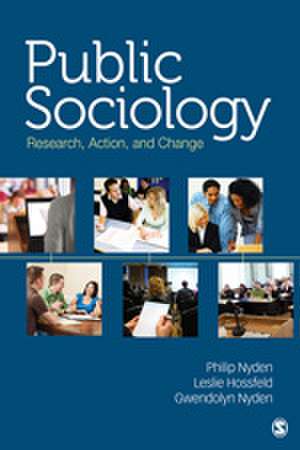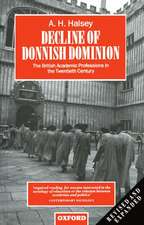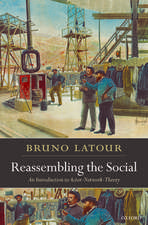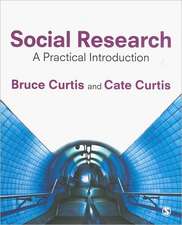Public Sociology: Research, Action, and Change
Autor Philip W. Nyden, Leslie H. Hossfeld, Gwendolyn Nydenen Limba Engleză Paperback – 14 iun 2011
Further, it emphasizes actions and connections. This is not armchair sociology where self-proclaimed public sociologists just write articles suggesting what government, corporations, communities, or others "ought to do." The authors are interested in the active connections to publics and users of the research, not the passive research process.
Preț: 557.24 lei
Preț vechi: 655.57 lei
-15% Nou
Puncte Express: 836
Preț estimativ în valută:
106.63€ • 114.02$ • 88.90£
106.63€ • 114.02$ • 88.90£
Carte tipărită la comandă
Livrare economică 17 aprilie-01 mai
Preluare comenzi: 021 569.72.76
Specificații
ISBN-13: 9781412982634
ISBN-10: 1412982634
Pagini: 336
Ilustrații: Illustrations
Dimensiuni: 152 x 229 x 19 mm
Greutate: 0.46 kg
Ediția:1
Editura: SAGE Publications
Colecția Sage Publications, Inc
Locul publicării:Thousand Oaks, United States
ISBN-10: 1412982634
Pagini: 336
Ilustrații: Illustrations
Dimensiuni: 152 x 229 x 19 mm
Greutate: 0.46 kg
Ediția:1
Editura: SAGE Publications
Colecția Sage Publications, Inc
Locul publicării:Thousand Oaks, United States
Recenzii
“The best part of this book at the prospectus reads is that it shows that sociologists are engaged outside the classroom and university walls. I think too often students see us lecture and in our offices, and think all we do is sit behind computers. Some of us do, but many of us like to be in the community trying to bring about change. It's a "get your hands dirty" approach that a lot of students miss with the typical textbook.”
Cuprins
Foreword by Michael Burawoy
Foreword by Steven Redfield
Foreword by Dan E. Moore
Acknowledgments
Chapter 1. Public Scholarship, the Sociological Imagination, and Engaged Scholarship
Chapter 2. Crossing Boundaries in 21st-Century Research
Chapter 3. Starting Up and Sustaining Public Sociology Projects
Chapter 4. Career Guide for Public Sociologists
Case Studies 1. Equitable Community Development
1.1 Educating About Homelessness: A University-City Government Research Partnership
1.2 Differential Impact of Gentrification and Displacement on Communities of Color
1.3 Research in Action: Inner City Entrepreneurs
1.4 Art and Equitable Community Development
Case Studies 2: Environmental Issues
2.1 Public Sociology for Environmental Health and Environmental Justice
2.2 Learning From Disaster: Documenting the Impacts of Hurricane Katrina on Displaced College Students From New Orleans
2.3 Working for Global Environmental Justice: Channeling Privilege, Producing New Knowledge
Case Studies 3: Regional Research and Data Collection to Enhance Public Knowledge
3.1 Neighborhood, Region, and Place: The Chicago Experience
3.2 The Sacramento State Annual Survey of the Region
3.3 Reducing Hunger in Oregon
3.4 PovertyEast.org: Poverty Information to Health Communities Address Critical Needs
3.5 Sociology in Public Service
Case Studies 4: Inequalities of Race, Class and Gender
4.1 Bringing a Feminist Sociology to Smart-Girl: Building a University-Nonprofit Partnership
4.2 Feminist Research in Action: An Intersectional Approach to Girlcentric Programming
4.3 Youth Participation in Community Research for Racial Justice
4.4 Building Resources to Create and Maintain Stable Diverse Communities
Case Studies 5: The Media
5.1 The Media, ACORN, and Presidential Politics
5.2 Pressuring Alcohol Companies to Reform Marketing Practices
5.3 The Reel Girls Project: Self, Image, Adolescence, and Filmmaking
5.4 The Internet as a Leveler Between Advantaged and Disadvantaged Communities
Case Studies 6: Health
6.1 Teen Pregnancy Prevention
6.2 Doing God's Work and Doing Good Work(s): Unique Challenges to Evaluation Research in Ministry Settings
6.3 Feast on the Southeast: Creating a Sustainable Local Food System in Southeastern North Carolina
6.4 Challenging Discrimination Against Women, Minorities, and the Sick in Health Insurance
6.5 Tobacco Use Prevention in Montana's Frontier Communities: Developing New Rural Strategies
Case Studies 7: Crime, Reducing Violence and Promoting Justice
7.1 Forty Years of Codifying and Mapping Homicides in Chicago: Impacts on Policing, Research, and Community Well-Being
7.2 Racial Disparities in Criminal Justice in Wisconsin: Analysis, Graphs, and Engagement
7.3 The Role of Relationship Building in Research Partnerships
7.4 Hate Crime Motivation: The Practical Consequences of an Offender Typology
Case Studies 8: Community Organizing
8.1 Cultivating Public Sociology From the Classroom: The Case of a Student-Organized Tenants Union
8.2 The Unity of Theory and Practice: The U.S. Social Forum and Movement Building for Social Transformation
8.3 When the Community Leads
8.4 The "Third Place" Project
Conclusion: The Case for the New, Engaged, 21st-Century Scholarship
About the Editors
About the Contributors
Index
Foreword by Steven Redfield
Foreword by Dan E. Moore
Acknowledgments
Chapter 1. Public Scholarship, the Sociological Imagination, and Engaged Scholarship
Chapter 2. Crossing Boundaries in 21st-Century Research
Chapter 3. Starting Up and Sustaining Public Sociology Projects
Chapter 4. Career Guide for Public Sociologists
Case Studies 1. Equitable Community Development
1.1 Educating About Homelessness: A University-City Government Research Partnership
1.2 Differential Impact of Gentrification and Displacement on Communities of Color
1.3 Research in Action: Inner City Entrepreneurs
1.4 Art and Equitable Community Development
Case Studies 2: Environmental Issues
2.1 Public Sociology for Environmental Health and Environmental Justice
2.2 Learning From Disaster: Documenting the Impacts of Hurricane Katrina on Displaced College Students From New Orleans
2.3 Working for Global Environmental Justice: Channeling Privilege, Producing New Knowledge
Case Studies 3: Regional Research and Data Collection to Enhance Public Knowledge
3.1 Neighborhood, Region, and Place: The Chicago Experience
3.2 The Sacramento State Annual Survey of the Region
3.3 Reducing Hunger in Oregon
3.4 PovertyEast.org: Poverty Information to Health Communities Address Critical Needs
3.5 Sociology in Public Service
Case Studies 4: Inequalities of Race, Class and Gender
4.1 Bringing a Feminist Sociology to Smart-Girl: Building a University-Nonprofit Partnership
4.2 Feminist Research in Action: An Intersectional Approach to Girlcentric Programming
4.3 Youth Participation in Community Research for Racial Justice
4.4 Building Resources to Create and Maintain Stable Diverse Communities
Case Studies 5: The Media
5.1 The Media, ACORN, and Presidential Politics
5.2 Pressuring Alcohol Companies to Reform Marketing Practices
5.3 The Reel Girls Project: Self, Image, Adolescence, and Filmmaking
5.4 The Internet as a Leveler Between Advantaged and Disadvantaged Communities
Case Studies 6: Health
6.1 Teen Pregnancy Prevention
6.2 Doing God's Work and Doing Good Work(s): Unique Challenges to Evaluation Research in Ministry Settings
6.3 Feast on the Southeast: Creating a Sustainable Local Food System in Southeastern North Carolina
6.4 Challenging Discrimination Against Women, Minorities, and the Sick in Health Insurance
6.5 Tobacco Use Prevention in Montana's Frontier Communities: Developing New Rural Strategies
Case Studies 7: Crime, Reducing Violence and Promoting Justice
7.1 Forty Years of Codifying and Mapping Homicides in Chicago: Impacts on Policing, Research, and Community Well-Being
7.2 Racial Disparities in Criminal Justice in Wisconsin: Analysis, Graphs, and Engagement
7.3 The Role of Relationship Building in Research Partnerships
7.4 Hate Crime Motivation: The Practical Consequences of an Offender Typology
Case Studies 8: Community Organizing
8.1 Cultivating Public Sociology From the Classroom: The Case of a Student-Organized Tenants Union
8.2 The Unity of Theory and Practice: The U.S. Social Forum and Movement Building for Social Transformation
8.3 When the Community Leads
8.4 The "Third Place" Project
Conclusion: The Case for the New, Engaged, 21st-Century Scholarship
About the Editors
About the Contributors
Index
Notă biografică
Descriere
A contemporary analysis of public sociology which highlights a variety of ways in which sociology brings about social change in community settings, assists nonprofit and social service organizations in their work, and influences policy.













